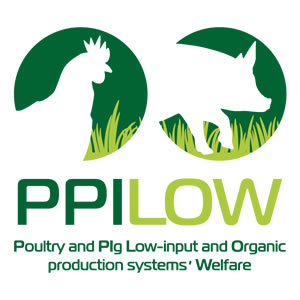AIAB Technical day!
On May 29th, the PPILOW Technical Day dedicated to organic poultry farming was held at the Pulicaro farm in Acquapendente, Italy.
 The meeting opened with a presentation of the PPILOW project, the One Welfare approach, the experiments conducted in the partner countries and the EBENE animal welfare self-assessment app. Experiments on on-farm hatching attracted interest and debate, as did those on the improvement of outdoor areas and pastures that were illustrated by the host farm where outdoor areas are adapted to the growth status of poultry to facilitate natural expression and exploratory behaviour.
The meeting opened with a presentation of the PPILOW project, the One Welfare approach, the experiments conducted in the partner countries and the EBENE animal welfare self-assessment app. Experiments on on-farm hatching attracted interest and debate, as did those on the improvement of outdoor areas and pastures that were illustrated by the host farm where outdoor areas are adapted to the growth status of poultry to facilitate natural expression and exploratory behaviour.
Francesca Pisseri, a veterinary agroecologist from the Italian Association of Agroecology, spoke about poultry farming from an agroecological perspective and which elements are important to promote animal health and welfare including nutrition and genetics suitable for grazing. She highlighted the positive effects on health of the farmer’s practices, illustrating the benefits of rational rotational grazing and permanent deep litter to reduce environmental bacterial and parasitic loads. She outlined the difficulties of applying the national biosecurity regulations to organic outdoor production systems.
 Marco Carbonara, the hosting organic poultry farmer, presented his experience applying multi-species rotational grazing on pastures. Being a reservoir of the indigenous microbiota, the soil has positive effects on the health of animals and of the overall agro-ecosystem.
Marco Carbonara, the hosting organic poultry farmer, presented his experience applying multi-species rotational grazing on pastures. Being a reservoir of the indigenous microbiota, the soil has positive effects on the health of animals and of the overall agro-ecosystem.
During the farm visit, the breeder showed the distribution of flocks according to their age and the strategies adopted against predators. He explained the practices adopted, i.e. low stocking densities, protein feed adapted to slow growing breeds, genetics adapted as far as possible to grazing, permanent bedding, phytotherapy and the pilot experience of guard dogs in rotational grazing. The strategy aims to reconcile welfare with health and, in the case of Pulicaro, has resulted in zero antibiotic resistance by creating a healthy environment for animals and people, in line with the One Welfare concept.
The discussion addressed the need to raise awareness among institutions and consumers of the peculiarities and additional work required to maintain high levels of animal welfare and health in organic and free-range farming. The meeting was attended by technicians, breeders, researchers, biodistricts and local institutions representatives interested in learning more about the day’s topics.




